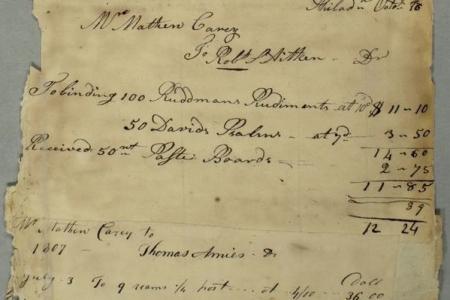
The Mathew Carey Papers Index provides access to 6,148 names for the people, firms, and ships mentioned in the financial records contained in Carey's papers. The papers consists principally of forty-one volumes of receipts, bills, memoranda, invoices, bills of lading, and other records of Carey's publishing business, and its successors, Carey, Lea, and Carey, and Lea and Blanchard. All volumes, except the last volume of Lea and Blanchard accounts for 1856-1857, are catalogued or indexed.
Download the index as a spreadsheet
The index, now available as a spreadsheet, was originally created in the 1920s. The spreadsheet contains the following for each name:
- volume number of the account book
- account number(s)
URL linked to image.
This link to the the AAS digital image archive, specifically to the box and folder in which the account number appears.
Flip virtually through the pages to find a specific account number.
Please note that a single page usually has multiple item (or account) numbers on it (to learn more about the paper in the records, please see our blog post on the digitization of this collection).
Using the Index
Please keep in mind the following when using the index.
- The indexed names have not yet been checked against Library of Congress Name Authorities (many of which would not be there). The names have been transcribed from the financial records themselves.
- Most of the names are for people, but firms and ships are also included. When a name refers to a firm, "Co." may appear at the end of the entry. If "Co." was included in the original index, then we have retained it in our data. When a name refers to a ship, it usually will have "(Ship)" or "(Schooner)" or (Brig.)" after the name.
- Articles such as "the" before any entries are not included
- Any punctuation marks at the beginning of an entry are not included
- The use of titles, such as "Rev." or "Cpt.", in names have been eliminated. However, the use of "Mrs" and Miss" when they were included in the original index has been retained because often this is the only way to identify the person as female.
- First name abbreviations have been eliminated when we could be certain of the spelling of the name. For example, "Wm." has been changed to "William" but "Nath." has not been changed because we could not be sure if the name should be "Nathaniel" or "Nathan."
- A first initial has been replaced with a full first name when we can be almost certain what the initial stands for. For example, we changed "Thomas, I." to "Thomas, Isaiah" but we did not change "Hearn, J." because the "J" could stand for a number of names.
- When we could not decipher the correct spelling of a name, we included both with one following the other in parentheses. For example, "Wheeler (Wheelen), Israel" because we could not be certain whether the final letter in the name is an "r" or an "n."
- Please also feel free to use that data for independent projects. We would love to know how it is used, so please contact our director of scholarly programs and partnerships with such news.
- If you have questions about the contents of the collection or locating a particular item, contact the Curator of Manuscripts.
- Most of the collection was disbound before it was digitized. This is not the case with folio volumes 35-37, which have their own indexes at the start of each folio. These indexes have been included in the index, but at times, account numbers are lost in the gutters of these volumes. When this is the case, we have included the numbers we can decipher, and used a "?" to mark the numbers we cannot.
- A "?" also appears in an index number when a number on an index card is unreadable because a hole has been punched in the bottom of the card.
About the Papers
The Mathew Carey Papers consist of receipts, bills, memoranda, invoices, bills of lading, and other records of his publishing business and its successors: Carey, Lea, and Company; and Lea and Blanchard. The finding aid will take you to the images for each box and folder, so if you want to browse by that organization level, please start there.
For more on how these papers came to AAS, please see visit our blog.
About Mathew Carey
Mathew Carey (1760-1839), publisher, economist, and humanitarian, was born in Dublin, Ireland. He came to the United States in 1784 after involvement in Irish revolutionary activities and took up his trade as a printer, publishing the Pennsylvania Herald and the periodical, The American Museum. His book publishing ventures prospered and his firm was a leader in American printing and publishing in the period 1795 to 1835. Carey was an active proponent of the protective tariff, as well as an ardent champion of oppressed minorities in Europe, especially after his retirement from business in 1821. His business was thereafter conducted by his son, Henry C. Carey (1793-1879).